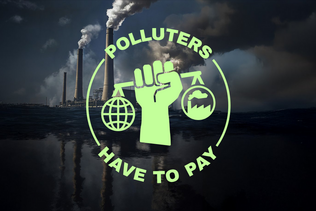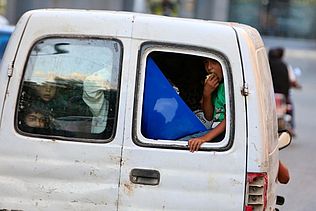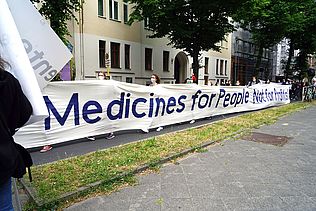By Anne Jung
More than 500 days have passed since - in the midst of the spreading Covid-19 pandemic - the governments of South Africa and India submitted a request to the World Trade Organisation (WTO) to temporarily suspend patents. A request guided by global principles. Whilst more than 100 countries, mainly from the Global South, supported the request, the majority of industrialised nations sought to defend economic interests instead of health imperatives, rejecting the request. A compromise proposal has since been put on the table, negotiated by the EU, the US, India and South Africa. Spoiler: It falls drastically short of the aim of global vaccine equity.
To recap: in their original request India and South Africa argue that a globally agreed waiver is needed for patents and other intellectual property rights for Covid-19 medical products and should apply until the pandemic is over. Combined with a technology transfer, this would allow production to be massively expanded at far lower cost than before. The waiver would also provide legal certainty against lawsuits by the pharmaceutical industry. The “compromise” now presented essentially confirms the previous positions of the US and the EU. It falls short in multiple respects. Firstly, it would only apply to vaccines, but not to therapeutics and diagnostics for the identification and treatment of Covid-19 cases. This is a huge problem, especially in countries where vaccines are still not widely available. A targeted testing strategy could help especially in countries where continued lockdowns are exacerbating impoverishment and hunger. Newly developed drugs to treat the sick also need to be available and affordable in order to prevent people from dying because they do not have the money for drugs that are overpriced due to patents.
Secondly, the compromise proposal complicates the procedure for granting compulsory licences without the consent of patent holders, which is already provided for in the TRIPS Agreement. Yet ramping up production swiftly is a matter of survival, also to prevent further mutations. So far, only 14 per cent of people in low-income countries have received a vaccination dose. Recently fewer first vaccinations had been administered there than booster vaccinations in high-income countries. But the Covid pandemic will not end just because there are enough doses in Europe. It is good that Moderna is voluntarily waiving patents. However, in view of the 17 billion US dollars that have been injected into the company from public funds in recent years, this should not be over-interpreted as a grand humanitarian gesture either.
Thirdly, the proposal that the patent waiver should not apply equally to all countries is particularly troubling. Instead it is supposed to be limited to so-called developing countries that exported less than 10 per cent of the world’s vaccine doses in 2021. A significant proportion of Astra Zeneca’s vaccine doses were produced in India. And in terms of expanding production and equitable access to vaccines, it would be irresponsible to exclude countries with significant production capacity such as China (where over 30 per cent of global exports were produced) and Brazil.
For two years now, we have been seeing the effects of the political acceptance of the underlying systemic conditions of neoliberal globalisation in the policy towards the pandemic. To safeguard the knowledge edge they have, the industrialised countries are willing to accept the prolongation of the pandemic with millions of deaths, concealing it with post-colonial rhetoric. Now is the “time of healing for our two continents”, stressed Commission President Ursula von der Leyen during the EU-Africa Summit, a breath later expressly excluding the suspension of patents from the “healing process”. South Africa’s President Cyril Ramaphosa countered: “What will get us out of the pandemic should be regarded as a public good. We don’t want to be receiving crumbs from anybody’s table.”
Now the countries of the South are being brought to their knees with a compromise that is not a compromise at all. Improvements hardly seem possible anymore, further deterioration by all means does. The problem is that once you have diluted whisky with water, it cannot be undone. But the public is being presented with a glass that looks nice and full. This is exactly how strategic pacification policy has always worked in the interest of the economy: For instance, once the treaty banning anti-personnel mines was signed, outlawing anti-vehicle mines could no longer be put on the political agenda. After the Kimberley Process on conflict diamonds, the issue was considered settled, although it was not worth the paper it was written on. Now is the last possible moment to make it clear to the public that this “compromise” is not acceptable. Political activity in our time must be based on the imperative of rebuilding the world together. Europe can throw its claim to be the defender of human rights on the rubbish heap of history once and for all if it does not finally begin to implement the promise of a global and social order with equal rights for all.




